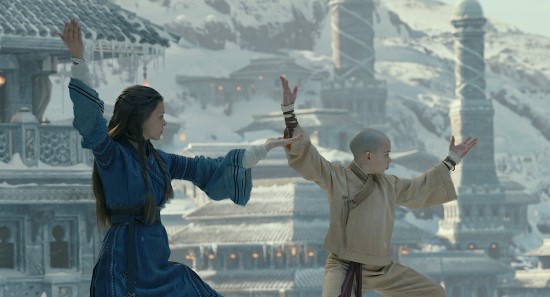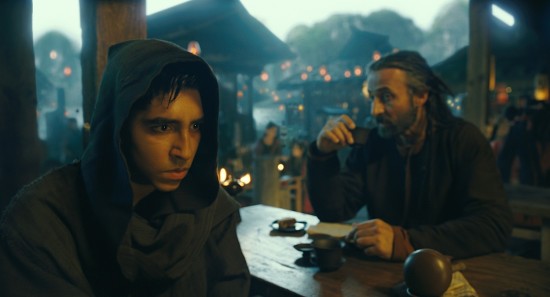The Last Airbender Review: The Last Straw For This Shyamalan Fan
We may receive a commission on purchases made from links.
With the release of The Last Airbender, M. Night Shyamalan's gradual metamorphosis into George Lucas is complete. Just like the Star Wars director, Shyamalan burst onto the scene with a couple innovative films (The Sixth Sense, Unbreakable), and displayed a talent for visuals early on. And just like Lucas, Shyamalan's screenwriting deficiencies, and his inability to properly take criticism from others, have led to his downfall. His previous film, The Happening, remained enjoyable on an MST3K-level, despite its issues. But with Airbender, Shyamalan delivers a film that's so singularly misguided, so devoid of a pulse — or anything that made the original series great — it's like watching a CGI-infused train wreck in slow motion and low-rent 3D.
After my interview with Shyamalan ended, in which he was incredibly enthused and proud about what he had made, I shook his hand and thought, "My god, you have no idea what's about to hit you."
The film is an adaptation of the Emmy-nominated Nickelodeon animated series created by Michael Dante DiMartino and Bryan Konietzko. It's the sort of source material that's so good, you'd have to try very hard to ruin an adaptation. And despite being a huge fan of the series, Shyamalan ended up doing just that.
Airbender's issues start with Shyamalan's script. Paring down the first 20-episode season of the series into a single film is admittedly a difficult task — it would be tough for even an accomplished screenwriter. For someone who has always showed weakness in his writing though, it seems downright impossible.
The film hits many of the first season's major events, but all of it feels disjointed. Case in point: At the very beginning of the film, Katara (Nicola Peltz) and Sokka (Jackson Rathbone) discover Aang (Noah Ringer) trapped in an iceberg. But instead of showing us the wonder and mystery of the event, the film cuts directly to Katara and Sokka's village, with Aang awake and fresh as a bird. The rest of the film is basically a collection of similarly disconnected scenes, unified only by Katara's overly-expository narration.
Clocking in at 103 minutes, the pacing of the film seems surprisingly rushed throughout. There's little chance for the characters, or the audience, to breathe.
Then there's the dialog, which is perhaps the most depressing failure. My brain is unable to process how anyone could hear something like "We need to show them that we believe in our beliefs as much as they believe in their beliefs" spoken aloud, and not realize something is dreadfully wrong. As we know from The Man Who Heard Voices, a book which details the director's journey to get Lady in the Water made, Shyamalan isn't too keen on constructive criticism. With The Last Airbender, he proves that he can no longer be trusted with writing his own scripts.
Consider how much better the Star Wars saga got when Lucas enlisted the help of talented writers for The Empire Strikes Back, and then look at his own laughable screenwriting work on the prequels. Shyamalan's situation at this point isn't very different: He's a talented visual stylist who needs serious help when it comes to things like story structure and dialog.
Shyamalan's weak script is exacerbated even further by some terrible casting choices. Noah Ringer may look like Aang, and he may be an accomplished martial artist, but he's no actor. When the film asks anything of him, he simply can't deliver. Ringer's Aang is a blank slate throughout most of the film — with none of the childlike joy or other qualities of Aang from the TV series. Again, that Shyamalan or anyone involved in the production didn't see this as a problem early on in production is simply shocking.
The other younger actors don't make out so well either: Peltz's Katara spends most of the film trying to be way too sincere, and Rathbone's Sokka is simply boring. Shyamalan removed much of the series' slapstick comedy for the film, which subsequently erased a big part of Sokka's personality. As the disgraced Fire Nation prince Zuko, Dev Patel is slightly more interesting than his compatriots — although he does take the angry routine way too far most of the time.
The casting for these characters was at the heart of the racebending controversy — primarily because it whitewashed the heroes of the film, and the villains became brown. One argument that was constantly brought up in defense of racebending allegations was that the leads were chosen for their talent — but we see little of that from Ringer, Peltz, and Rathbone. Meanwhile, in scenes featuring the Fire Nation army, it's hard not to notice that all of the villains in the film are distinctly darker in skin tone than our heroes.
Shyamalan still denies claims of racebending, and he believes that it's the "most culturally diverse tentpole movie ever made." While that statement may be true, I still think he's missing the greater point being made by racebending critics.
Rounding out the major Fire Nation cast is Aasif Mandvi (The Daily Show, Jericho) — who either turns in a brilliantly campy, or just plain terrible performance as Commander Zhao — and Cliff Curtis (Sunshine) as Zuko's father, the evil Fire Lord Ozai. I'm a fan of both actors, and some may find something to enjoy from Mandvi's performance, but Curtis's Ozai struck me as overly bombastic and surprisingly nonthreatening.
Practically all of the actors affect the same stilted and distant acting style throughout the film, which is yet another Lucas-ism we can attribute to Shyamalan.
There are a few positives amidst the relentless disappointment: Shaun Toub (Iron Man, The Kite Runner) completely owns the role of Iroh — Zuko's uncle and caretaker. He displays the perfect amount of tenderness and understanding towards his troubled nephew, and he's by far the strongest actor in the film. James Newton Howard also delivers a suitably epic score — which at times elevates the film, and in other cases makes the film's many flaws even more glaring.
There's also no denying that the ILM-produced special effects are fantastic, and to his credit, Shyamalan integrates them well into his own impressive visual style. The fight scenes are also well choreographed, and offer some of the only thrills in the film. Shyamalan shoots them wide with his traditional long takes — which is refreshing, and at times even mesmerizing. If only the rest of the film measured up the same.
As a longtime Shyamalan defender, The Last Airbender is the last straw for me. I still think he's talented, but that's currently being overshadowed by his many weaknesses as a film maker. Until he gains a bit of humility and learns to listen to criticism, I'm afraid we may never again see the talented young film maker who gave us The Sixth Sense and Unbreakable. Fans of the series should avoid the film entirely if only to be spared the heartbreak.
/Film Rating: 4 out of 10


